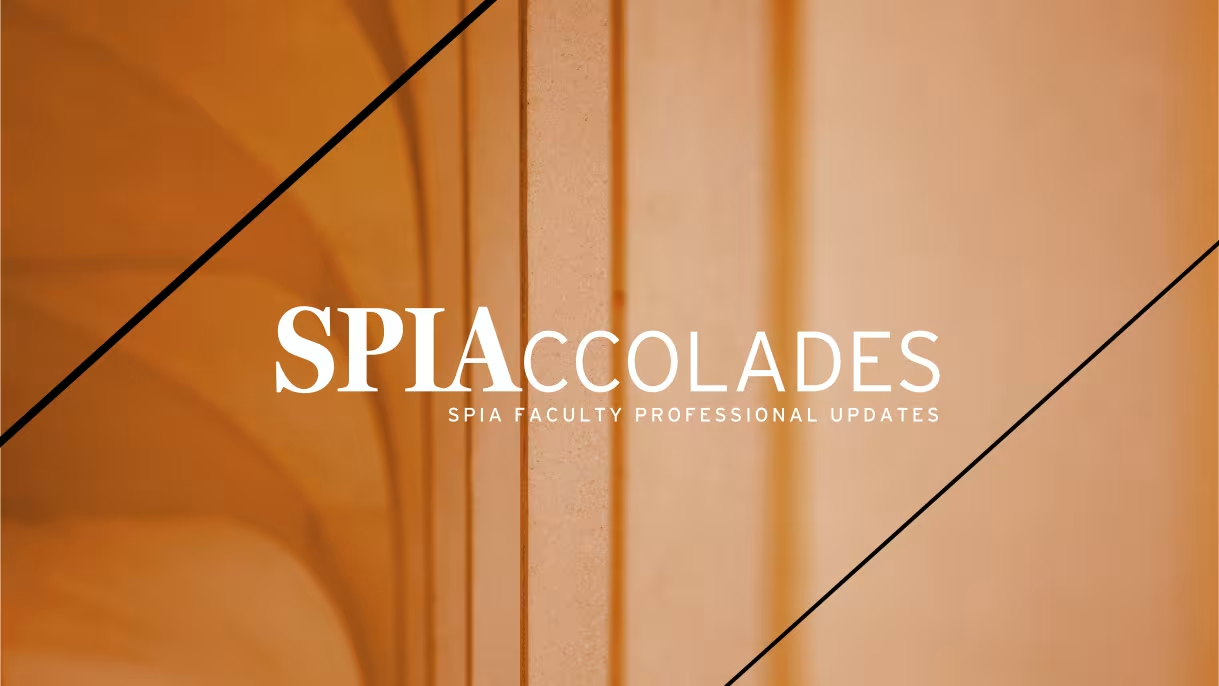

SPIAccolades — October 2025
SPIA Faculty Earn Recognition from MIT, Sciences Po, Google

Tessa Lowinske Desmond, a professional specialist at the Princeton School of Public and International Affairs, is part of a team that was recently awarded a 2025 Indigenous Communities Fellowship by MIT Solve, a Massachusetts Institute of Technology initiative that seeks “exceptional and diverse solutions to the most pressing global challenges.”
Desmond’s team, the East Coast Seedkeepers, was recognized for its work identifying, growing, researching, and saving ancestral seeds in partnership with people from Nanticoke and Lumbee communities to address food insecurity, food sovereignty, and climate resilience. Solve’s Grand Challenge selects teams with “exceptional innovators supporting community-based solutions for and with Indigenous communities.”
East Coast Seedkeepers, a collaboration among Emory University, Native Roots Farm Foundation, New Ground Farm, and The Seed Farm at Princeton, which Desmond directs, receives a $10,000 prize and, more significantly, joins the MIT Solve network, which includes prospective funders and invitations to specific calls for proposals. MIT Solve also mentors the winners, offering support for networking, prototyping solutions, and scaling.
“Seeds are ancient technologies. It’s significant to have an organization like MIT Solve recognize that promising solutions to our urgent problems can come from old ways of knowing,” Desmond said. “In a time when capital-intensive and techno-utopian solutions to climate problems attract a lot of attention, it’s encouraging that MIT Solve is making space for innovation rooted in traditional ecological knowledge that has provided wisdom and answers for millennia.”

Sanyu A. Mojola, the Maurice P. During Professor of Demographic Studies and a professor of sociology and public affairs, was awarded a visiting faculty fellowship by Sciences Po, Paris, a research university in France, for her sabbatical. Mojola studies how societies produce health and illness, investigating how social dynamics within schools, communities, labor markets, cities, and ecosystems can lead to health inequality. She is based in the school’s Centre for Research on Social Inequalities and is using the fellowship to work on her third book, tentatively titled "Nowadays Diseases: Aging through Social Change in Rural Post-Apartheid South Africa,” along with other smaller projects.
"I am grateful to have an opportunity to spend time in a fantastic interdisciplinary center full of scholars collectively grappling with different forms of social inequality on the European continent and around the globe," Mojola said.


Jacob N. Shapiro, Princeton SPIA’s vice dean of strategic initiatives and the John Foster Dulles Professor in International Affairs, and Kevin T. Greene, an academic research manager with the Empirical Studies of Conflict Project, were selected to receive a Google Academic Research Award for their project “Methods for Systematic Audits of Risks from Malign Actors' Use of Generative AI.”
The awards, according to Google, “support groundbreaking foundational and applied research in computing and technology around the world.” Shapiro and Greene’s project seeks to gauge the prevalence and extent of “known foreign propaganda” being repeated by chatbots such as ChatGPT, DeepSeek, and Gemini, or serving as sources for their content.
“With this support we will build and evaluate an automated pipeline to conduct realistic over-time assessments of the risks posed by malign actors’ use of generative AI systems. This is critical for moving discussions of these risks beyond isolated examples and toward empirically grounded analyses that are a better basis for policy actions by companies and governments,” Shapiro said. “We are excited about this award from Google and look forward to connecting with the Google research community on this important topic.”

